At the Aspen Institute Economic Opportunities Program, and for our many colleagues and partners, the ongoing and intertwined health, economic, and racial justice crises bring new urgency to our work to improve access to quality jobs, options to participate in business ownership, and the freedom to pursue economic opportunity. Below we share our monthly newsletter with highlights of recent work. As always, we welcome your feedback, thoughts, and partnership in advancing inclusive opportunity and an economy in which we all can thrive. Click here to subscribe.
Click here to view past editions of our newsletter.
News and Updates
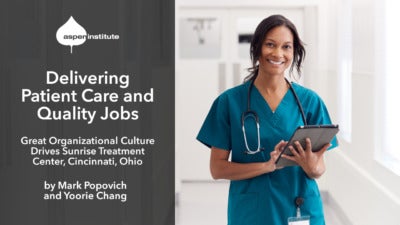
Delivering Patient Care and Quality Jobs
Improving job quality not only transforms workers’ lives, but it also benefits businesses’ performance and bottom lines. Highlighted in this brief by Mark Popovich and Yoorie Chang is Sunrise Treatment Center, a leader in the addiction treatment sector that provides stable, sustainable jobs. Founder Dr. Jeffrey Bill, Chief Operating Officer Steven Smith, and Chief Human Resources Director Brett Burns developed strategies to simultaneously meet the needs of their patients and their commitment to employees. Sunrise Treatment Center saw sustained growth and improvement in both capacity and caregiving by ensuring that the focus of the organization was explicitly two-fold: to provide the highest quality of treatment for patients with substance abuse issues and mental illness, and to offer a great place to work for employees. Read more here.
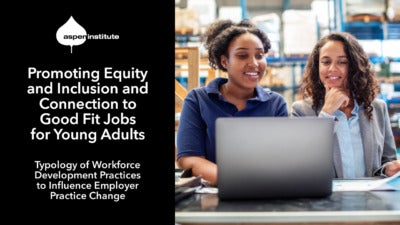
Promoting Equity and Inclusion and Connection to Good Fit Jobs for Young Adults
Even while general unemployment begins to improve, millions of young workers, especially young people of color, are out of school and work. This disconnect can have lasting effects, including long-term unemployment or long-term employment in low-quality jobs. As a national partner to the Annie E. Casey Foundation’s Generation Work initiative, the Aspen Institute Economic Opportunities Program has been conducting research with community-based practitioners working directly with employers to build more equitable and inclusive employment practices. Workforce partners in Generation Work communities have tried and tested a range of strategies, which are highlighted in a new typology of promising practices, “Promoting Equity and Inclusion and Connection to Good Fit Jobs for Young Adults.” The brief, by Ranita Jain and Amy Blair, aims to help workforce practitioners engage with employers around supporting equity and inclusion in the workplace and to expand good-fit jobs in their communities. Read it here.
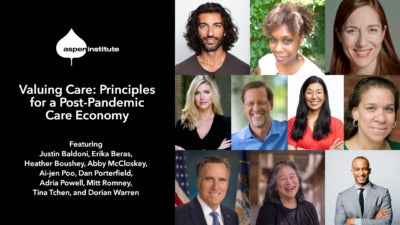
A Historic Moment for the Care Economy
The experience of giving and receiving care is deeply personal – and is also a key structural challenge for American society, as the past pandemic year has made clear. On April 21, the Economic Opportunities Program hosted a special event, Valuing Care: Principles for a Post-Pandemic Care Economy, which brought together policymakers, experts, caregivers, and cultural leaders for a wide-ranging conversation on the value of caregiving and ideas to strengthen the care economy – the paid and unpaid labor and services that support caregiving in all its forms. In a new blog post, Future of Work Initiative Fellow Natalie Foster and Senior Project Manager Amanda Newman reflect on this event, highlighting key takeaways and clips from the session. Watch and read more here.

Building an Infrastructure of Care
The economy needs a healthy care economy to operate. We live in an economy that expects something approaching full employment. But people can’t go to work—or, in many cases, even work from home—if they can’t be confident that loved ones in need of care aren’t being looked after. This blog post by David Gibson followed the recent event, Valuing Care: Principles for a Post-Pandemic Care Economy, to explore what it means to build an infrastructure of care for America. Read more.

America Has a Jobs Problem — There Aren’t Enough Good Ones
In the wake of 2020, we have come to understand that both essential workers and those who lost their livelihoods overnight have, for far too long, had to navigate unsafe, even demeaning workplaces, with limited voice and representation. The reality is that about half of America’s working population earns less than a living wage. It is past time to update federal policy and support all of our workforce in a way that matches its skills, talents and contributions to America’s success. In the rebuilding year ahead, Americans need and deserve better jobs. Expanding the number of good jobs, and improving the quality of existing ones, must be an essential goal of the Biden administration. Read more from Amanda Cage, Maureen Conway, Jeannine Laprad, and Sarah Miller here.

Updates from the Employer Network Advancing Digital Skills and Equity
The Employer Network Advancing Digital Skills and Equity, led by UpSkill America in partnership with Digital US, adopted its workplan for the year, which includes network building, tool and resource identification and development, and thought leadership. Network members, employers from across industry sectors who are working together to ensure the country’s workers, learners, and communities have the digital access and digital skills essential for thriving in a post-COVID digital economy, are committed to sharing what they are learning about employer digital skill needs and what that means to outside groups. One such conversation, “The Urgency of Digital Skills,” took place on June 25, hosted by the National Association of Workforce Boards. UpSkill America Director Jaime Fall moderated the discussion, which included Lisa Schumacher (Director, Education Strategies, McDonald’s Corporation), Andrew Tein (Vice President, Global Government Affairs & Bridge Education, Wiley), and Patti Constantakis (Director, Corporate Philanthropy, Walmart.org), who also spoke at our March event on digital transformation for frontline workers.
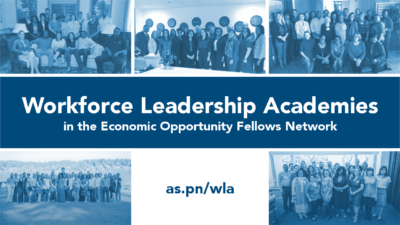
News from the Workforce Leadership Academies
Following their three-day opening retreat in May, Fellows in the Greater Phoenix Workforce Leadership Academy convened again in June for the first of five virtual sessions. This session focused on practical strategies and tools to strengthen job quality. Workforce Strategies Initiative Associate Director Jenny Weissbourd interviewed leaders from a Chicagoland workforce-employer partnership — Alita Bezanis, director of organizational development at Pete’s Fresh Market and Yesenia Cervantes, dean of career pathways and community affairs at the Chicago-based Instituto del Progreso Latino — who shared how they collaborate to strengthen job quality and retention for frontline workers at Pete’s. Fellows brainstormed how they can apply job quality strategies in the Phoenix workforce ecosystem or within their own organizations. Stay tuned for an update on next month’s session that will focus on data-driven decision-making. Click here to learn more about the Workforce Leadership Academies.

Social Enterprise Growth Models: Employee Ownership
Converting to employee ownership offers companies an opportunity to live their values by empowering workers to share in the value they help to create—a strategy that is proven to increase productivity, lower turnover and help purpose-driven companies separate themselves from the competition. On June 3, from 5-6 p.m. EDT, Workforce Strategies Initiative Associate Director Jenny Weissbourd gave opening remarks at “Social Enterprise Growth Models: Employee Ownership,” a discussion hosted by Owners to Owners, an initiative of Employee Ownership NYC. This discussion featured two leaders of employee-owned companies , government and community leaders, and employee ownership experts discussing the business and workforce benefits of employee ownership and supports for business owners exploring conversion. Watch the full session here.

Improving Job Quality & Strengthening Social Safety Net Programs for All California Workers
On June 7, from 2-3:30 p.m. EDT, EOP Executive Director Maureen Conway moderated a webinar on “Improving Job Quality & Strengthening Social Safety Net Programs for All California Workers.” In this session—part of the Skills for California Summit 2021—participants discussed how to ensure greater fairness and opportunity for workers earning low wages, reducing wage theft, ensuring access to rights and benefits afforded in current law, providing affordable housing for workers, and supporting worker safety nets. Panelists included Peter Callstrom (San Diego Workforce Partnership), Cesar Lara (MILPA; Monterey Bay Central Labor Council), and Lola Smallwood-Cuevas (UCLA Labor Center). Click here to watch the recording of the event.
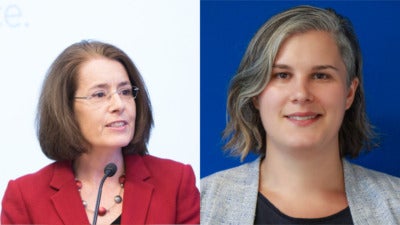
Community Economic Development Grantee Conference
EOP Executive Director Maureen Conway and Workforce Strategies Initiative Associate Director Jenny Weissbourd participated in this year’s all-virtual Community Economic Development Grantee Conference from June 8-10. Their session, “Job Quality: What is it, why is it important, and what can you do about it?” included fellow panelists Eli Allen (Civic Works) and Shawn Parker (Connie’s Chicken and Waffles), who shared practical approaches that they use to advance job quality. Parker joined us at our recent Job Quality in Practice Webinar, Can Investing in Workers Support Small Business Resiliency Through the Pandemic?, which you can view here. The conference was hosted by the Office of Community Services, within the Administration of Children and Families at the US Department of Health and Human Services. A full recording of the event can be found here.

Race and Gender Wealth Equity and the Role of Employee Share Ownership
On June 16, Workforce Strategies Initiative Associate Director Jenny Weissbourd and Joseph Blasi, distinguished professor and director of the Institute for the Study of Employee Ownership and Profit Sharing at Rutgers University, participated in the Computershare conference. Their session, “Race and Gender Wealth Equity and the Role of Employee Share Ownership,” made a case that business leaders who care about racial and gender wealth equity should explore opportunities for broad-based ownership, and offered strategies to do so in practice. The discussion followed the release of our recent publication, Race and Gender Wealth Equity and the Role of Employee Share Ownership, coauthored by Weissbourd, Blasi, and colleagues at the Aspen Institute, the Democracy at Work Institute, and Rutgers University.

CSG Healthy States National Task Force
On June 22, EOP Executive Director Maureen Conway participated in an Economic and Workforce Health Subcommittee meeting for the Council of State Governments Healthy States National Task Force. The subcommittee explored policies that build long-term, sustainable, and equitable programs and services, such as apprenticeships, unemployment insurance, occupational licensure, and broadband access. Click here to watch Conway’s remarks.

Illuminating the Future of Work
Shelly Steward, the director of the Future of Work Initiative, joined the Massachusetts Future of Work Commission on June 29 for a presentation about how to prepare workers, businesses, and communities to thrive in the future of work. She joined State Senator Lesser and his team, and fielded questions from notable figures in the field such as Harry Dumay, President of Elms College; Joanna Feinberg Goldstein, Former Massachusetts Secretary of Labor and Workforce Development; and Steve Tolman, President of Massachusetts’ American Federation of Labor and Congress of Industrial Organizations. She spoke about the gig economy, portable benefits, and forward-thinking approaches to trends in the labor market and the steps to evolving a more equitable economy. Click here to view a recording of the discussion.
Considering the Impacts of Automation
Steward also spoke on a panel about The Future of Automation in the Workforce at the National Association of Counties’ Counties At Work Virtual Summit on June 10. The conversation addressed the range of ways technology is impacting labor markets, and what solutions counties can introduce to promote equity and opportunity. Steward was joined by experts from Pew Research Center and Partner4Work on a panel moderated by Travis County, Texas Commissioner Brigid Shea. The event recording is available here.
Upcoming Events
EOP will continue to host virtual events and webinars this season. Join our mailing list and follow us on social media to learn when new opportunities are available.
Join the conversation
Follow EOP on social media to join the conversation!
-Workforce Strategies Initiative @AspenWorkforce
-Business Ownership Initiative @Aspen_BOI
-UpSkill America @upskillamerica
-Future of Work Initiative @AspenFutureWork
About EOP
The Aspen Institute Economic Opportunities Program (EOP) advances strategies, policies, and ideas to help low- and moderate-income people thrive in a changing economy. We recognize that race, gender, and place intersect with and intensify the challenge of economic inequality and we address these dynamics by advancing an inclusive vision of economic justice. For over 25 years, EOP has focused on expanding individuals’ opportunities to connect to quality work, start businesses, and build economic stability that provides the freedom to pursue opportunity. For more information, visit as.pn/eop.
EOP has several initiatives, including the Business Ownership Initiative, Workforce Strategies Initiative, UpSkill America, Good Companies/Good Jobs, and the Future of Work Initiative. In addition, across these approaches EOP hosts the Economic Opportunity Fellows Network and the Opportunity in America event series.
Thank you to our many partners and funders for supporting our efforts.
Support Our Work
We are committed to making our events and publications freely available to everyone who finds them useful. But if you find value in our work and are able to support it, please consider making a tax-deductible donation. Click here to learn more.
Keep in Touch
Click here to join our mailing list. For updates every day, follow us on social media.

